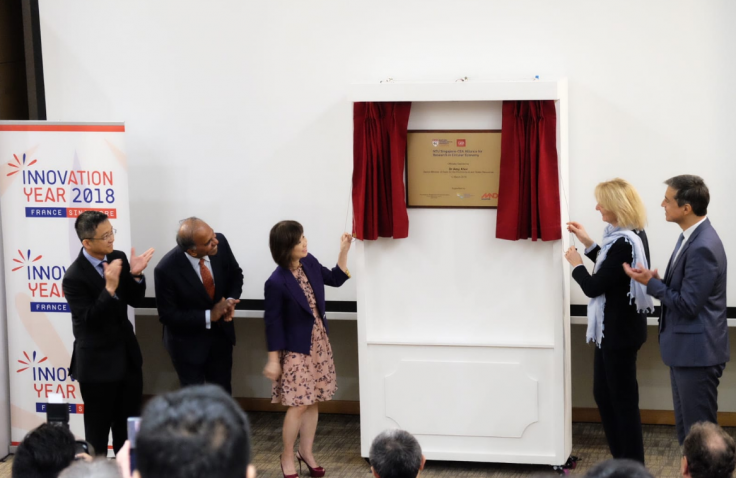
Singapore's Nanyang Technological University (NTU) and the French Alternative Energies and Atomic Energy Commission (CEA) have joined hands to launch a research centre. Singapore's Senior Minister of State for the Environment and Water Resources, Dr Amy Khor inaugurated the joint research centre on Wednesday.
The objective of the collaborated project is to develop innovative, energy-efficient solutions for the recycling and recovery of resources from electrical and electronic waste (e-waste).
The newly launched research centre is named as "NTU Singapore-CEA Alliance for Research in Circular Economy" (NTU SCARCE). As per a news release, this centre will focus on four research thrusts that address the recycling and recovery of materials from common e-waste such as discarded lithium-ion batteries and printed circuit boards.
It should be noted that CEA, established in 1945, is a French public government-funded research organisation and the NTU SCARCE is CEA's first research centre outside the French soil. As per the release, "It will look at formulating advanced e-waste separation and extraction techniques that are more eco-friendly and energy efficient than current methods."
The collaboration is supported by National Environment Agency (NEA) under the agency's Closing the Waste Loop (CTWL) Research and Development (R&D) Initiative. For this joint program, these three organizations are contributing S$20 million.
The research centre will also support country's drive towards becoming a Zero Waste nation by finding ways to reduce consumption of materials, as well as reusing and recycling them to give them a second lease of life.
NTU President Professor Subra Suresh stated, "This joint research centre will grapple with one of the most increasingly important issues in recycling as the world continues to produce more electronic devices and e-waste."
He also added that NTU SCARCE will be focusing on acquiring new methods and technologies to process and recover precious materials from e-waste, while minimising environmental impact. Prof Suresh believes that this is also one of the core tenets of the NTU Smart Campus initiative, which aims to develop technologically advanced solutions that is required to structure a better future.
Senior Minister of State for @MEWRsg Dr @AmyKhor launched the new NTU Singapore-@CEA_Recherche Alliance for Research in Circular Economy at @NTUsg today. The research centre will develop new tech to recover useful materials from #ewaste. https://t.co/atJutp6n4Z pic.twitter.com/wJy2YpQED2
— NTU Singapore (@NTUsg) March 13, 2019
Dr Laurence Piketty, the Deputy Chairman of CEA addressed that the French organization has been collaborating with NTU since 2012 on materials science.
"The creation of the joint NTU-CEA laboratory, our first one to be implemented abroad, is a new decisive step in that way. More than 15 CEA researchers will spend extended periods in Singapore to strengthen this collaboration. This will make the most of CEA's world-renowned expertise and technologies in materials recycling and waste management," she further added.
Dr Piketty also stated that through this collaboration, the CEA will examine "solutions for recycling batteries, solar panels and for the treatment of electronic waste, where our R&D and innovation will be translated into industrial processes for getting high value-added products."
"The S$45 million 'Closing The Waste Loop' research funding initiative by NEA encourages collaborations among institutes of higher learning, research institutes and private sector partners, to develop technologies and solutions to tackle challenges posed by increasing waste generation, scarcity of resources and land constraints for waste management," she also added.
The Chief Executive Officer of NEA, Tan Meng Dui said that the organization is making a steady and heavy investment in R&D initiatives to address the challenges in the field of waste management.
"A key thrust of NEA's technology masterplan is waste-to-resource R&D initiatives, which is aligned to our circular economy approach to move Singapore closer to its vision of a Zero Waste nation. We are delighted with this joint partnership with NTU Singapore and CEA France, in the form of SCARCE. The focus on e-waste is apt given the pervasiveness of digital technologies, and addresses both important resource recovery and public health needs," Dui added.
The NTU-CEA research centre has four research thrusts that will look into recycling and recovering materials from:
- lithium-ion batteries;
- silicon-based solar panels;
- printed circuit boards from discarded e-waste; and
- detoxifying plastic parts in e-waste.
Madhavi Srinivasan, who is the Co-Director of the research centre and an NTU professor said that each year almost 60,000 tonnes or 11kg of e-waste per person are generating each year in the country. She believes that this research centre will not only support the nation's mission to find new ways to recycle e-waste in a sustainable and eco-friendly manner but also extract materials that can be re-used again.
Co-Director Dr Jean-Christophe P. Gabriel also mentioned that the "Electronic waste recycling concentrates many of the issues that must be solved and is the perfect testbed towards that aim. Together with my colleagues in CEA, we are thrilled by this opportunity to work in synergy with our Singapore partners."









